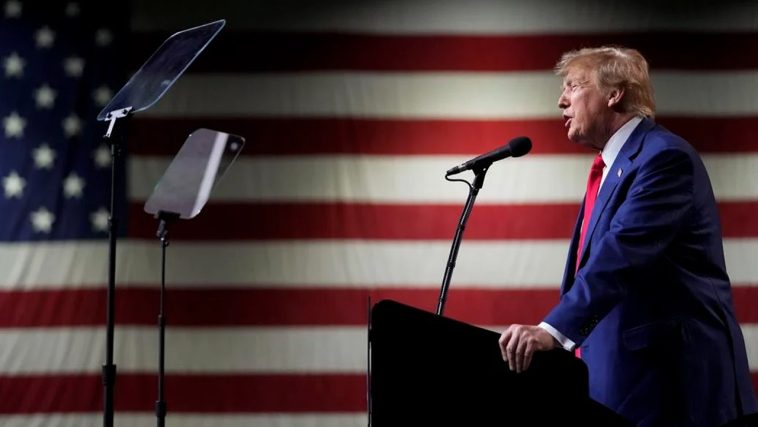LISTEN HERE:
A distinguished federal judge in the state of Nevada recently upheld the integrity of the democratic process by dismissing a case that sought to question the eligibility of former President Donald Trump to run for office in the 2024 election. John Anthony Castro, an aspirant for the Republican presidential nomination, but considered by many as a long shot, found himself on the wrong end of the verdict. Judge Gloria Navarro maintained that Castro did not hold the required standing to challenge Trump’s eligibility.
Considering the potential implications of the case, Judge Navarro’s verdict underscores the importance of procedural fairness. Castro’s attempt to validate his standing by filing for a presidential run did not convince the court. Navarro found that this action was an inappropriate attempt to construct legitimacy solely to instigate the lawsuit, thereby dismissing a possible politically motivated contention.
Furthermore, the Judge’s ruling offers reassurance that politics should remain within the political sphere and not encroach into the battleground of the courts. The ruling clearly indicates that Castro’s challenge is contained within the jurisdiction of Nevada. The larger implications, particular to the former President Trump, is that instead of the Nevada primary, he will participate in the Republican caucus in the state.
Consequently, Castro’s 14th Amendment claims have not found much success across the nation, as numerous states, including Florida and New Hampshire, rejected his allegations against Trump. A looming question that the U.S. Supreme Court justices will soon address relates to the eligibility of Trump for running for president again, in the lens of the constitutional prohibition restricting insurrectionists from holding political office.
In a surprising turn of events, two states have declared Trump ineligible citing an age-old 19th-century amendment to the U.S. Constitution. They posit that Trump’s connection with the unfortunate incidents at the U.S. Capitol on January 6, 2021, prevent him from running. However, an expanding tally of states have affirmed that the supposed insurrection clause of the amendment is not relevant to Trump’s case.
Earlier, the U.S. Supreme Court agreed to an emergency appeal from attorneys for Trump after the Colorado Supreme Court excluded him from that state’s 2024 ballot the previous month. This decision of the nation’s highest court reinforces the importance of due process. All briefs for the case must be filed by January 31, and the justices are to hear oral arguments on February 8.
Adding to this, the Supreme Court provided an interim relief to Trump by issuing a stay on Colorado’s order. The state’s secretary has been directed to include Trump’s name back on the ballot until the final decision is reached. This significant move ensures the fairness of the system while the issue is conclusively resolved.
The 14th Amendment’s provision that disallows ‘officers’ of the United States who engaged in ‘insurrection’ to run for elected office was invoked by the Colorado court to bar Trump. The Supreme Court justices are likely to interpret the meaning of ‘engaged in insurrection’ in their forthcoming deliberations, making their decision highly anticipated.
In another development, a lawsuit aiming to remove Trump from the election ballots in Wyoming was dismissed by a local District Court Judge, much to the joy of Wyoming Republican Secretary of State Chuck Gray. Retired lawyer Tim Newcomb had filed a lawsuit against Gray in the Albany County District Court, targeting both Trump and Republican Senator Cynthia Lummis.
Newcomb accused Trump and Lummis of being ‘traitors’ to the Constitution in relation to the chaotic events of January 6, 2021, at the U.S. Capitol Building. The 14th Amendment, ratified post-Civil War, prohibits officials who engaged in insurrection from upholding public office, provided they pledge allegiance to the Constitution.
However, lack of clarity and specific reference to the presidency in the Amendment’s language, combined with its sparse usage since 1919, raises questions about its applicability. Speaking on the issue, Trump condemned the litigation citing 14th Amendment as an abuse of the judicial process while denying any malpractices related to that fateful day in January.
Never one to back down, Trump also entered a not-guilty plea against both federal and state-level allegations regarding his attempts to alter the results of the 2020 election. Understandably, these contentious legal proceedings didn’t deter his supporters, with numerous parties including a handful of attorneys general from states under Republican control rallying to his cause.
Before the eventual ruling, a significant number of parties, including over a dozen Attorneys General from Republican-majority states came forward to challenge the constitutionality of Trump’s exclusion from Colorado’s 2024 ballot. Beyond the immediate political implications, this case highlights the robustness of our democratic process and the rule of law.
As we continue to navigate through the turbulent waters of contemporary politics, cases like these present opportunities to reassess and reinforce the foundations of our democracy. The future of Donald Trump’s political career still hangs in the balance as we await the definitive ruling on his eligibility to run for office in 2024.



